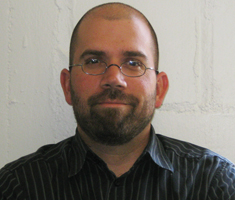 |
|

Celf Specialization: Archaeological Anthropology & Ethnoarchaeology
Anthony P. Graesch is an anthropological archaeologist who conducts research on the organization and materiality of household life in the contemporary and in the past. At CELF, he designed and innovated several ethnographic and ethnoarchaeological methods for studying the material worlds of
twenty-first century dual-income families. His contributions to the broader pool of literature addressing work-family research include articles
in Social Indicators Research, Sociological Methodology
, Journal of Family Psychology, and several edited volumes.
Much of this work is the outcome of collaborations with linguistic anthropologists, cultural anthropologists, and clinical psychologists, epitomizing the utility of interdisciplinary social science research.
Dr.
Graesch sees a valuable epistemological approach to the archaeological study of household behavior emerging from a consideration of how assemblages of
objects are used in concert with the built environment, talk, and embodied
action. His ethnoarchaeological research with CELF data is guided by
several questions: 1. How do household objects (and assemblages of objects) organize attention and help to structure social interactions and activities? How do our possessions affect everyday decisions and attitudes?2. What parts of family homes are remodeled, and how are costly remodeling events prioritized? How does home remodeling reflect on household
economy and the exigencies of daily life?3. How do families use their
home spaces and what can we learn about the role of domestic architecture in household organization from the types, frequency, and locations of activities in the house? How can we apply CELF findings to the study of houses and households in other present and past cultural contexts?4.
In what ways do the material worlds of modern American families reflect attitudes and values about consumerism, sustainability, and solvency?
--Selected Publications (Interdisciplinary Social Science Research)--
Graesch, A. P. (2013). At Home. In Fast-Forward Families: Home, Work, and
Relationships in Middle-Class America, edited by E. Ochs and T. Kremer-Sadlik. University of California Press. In press.
Arnold, J. E., A. P. Graesch, E. Ragazzini, and E. Ochs. (2012). Life at Home in the Twenty-First Century: 32 Families Open Their Doors. Cotsen Institute of Archaeology Press, Los Angeles.
Saxbe, D. E., A. P. Graesch, and M. Alvik. (2011). Television as a social or solo activity: Understanding families' everyday television viewing patterns. Communication Research Reports
28(2):180-189.
Saxbe, D. E., R. Repetti, and A. P. Graesch. (2011). Time spent in housework and leisure: Links with parents' physiological recovery from work. Journal of Family Psychology 25(2):271-281.
Graesch, A. P. (2009). Material indicators of family busyness. Social Indicators Research 93(1):85-94.
Campos, B., A. P. Graesch, R. Repetti, T. Bradbury, and E. Ochs. (2009). Opportunity for interaction? A naturalistic observation study of dual-earner families after work and school. Journal of Family Psychology 23:798-807.
Klein, W., A. P. Graesch, and C. Izquierdo. (2009). Children and chores: A mixed methods study of children’s household work in Los Angeles families. Anthropology of Work Review 30(3):98-109.
Broege, N., A. Owens, A. P. Graesch, J. E. Arnold, and B. Schneider. (2007). Calibrating measures of family activities between large- and small-scale data sets. Sociological Methodology 37(1):119-149.
Ochs, E., A. P. Graesch, A. Mittman, T. Bradbury, and R. Repetti. (2006). Video ethnography and ethnoarchaeological tracking. In The Work-Family Handbook: Multi-Disciplinary Perspectives and Approaches to Research, edited by M. Pitt-Catsouphes, K. Kossek, and S. Sweet, pp. 387-409. Lawrence Erlbaum Associates, New Jersey.
Graesch, A.P. (2004). Notions of family embedded in the house. Anthropology News 45(5).
| |
